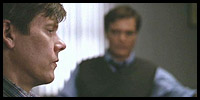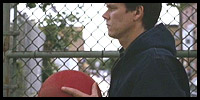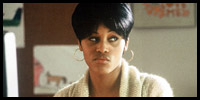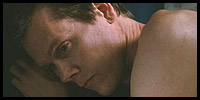
 |
|
The Woodsman (2004) Cast: Kevin Bacon, Kyra Sedgwick, Benjamin Bratt, Mos Def, Eve, David Alan Grier, Hannah Pilkes, Michael Shannon, Kevin Rice, Carlos Leon 2004 – 87 minutes Rated: Reviewed by Dustin Putman, December 29, 2004.  When convicted child molesters step outside their prison cells and must, once again, enter society, how do they cope with their past actions even as they must face their future? This is the question posed and the topic explored in "The Woodsman," an understated drama simmering just underneath the surface with explosive emotions and occasionally breathless intensity. As written and directed by Nicole Kassell, the touchy subject of pedophilia is viewed thoughtfully and free of bias. Kassell does not ask for the audience's affections toward her central character, and she doesn't deny that what he has done is an awful thing. At the same time, she chooses not to condemn him, instead studying his disturbed—but not insane—psyche as he realistically deals with reemerging temptations and fervid sexual desires.
When convicted child molesters step outside their prison cells and must, once again, enter society, how do they cope with their past actions even as they must face their future? This is the question posed and the topic explored in "The Woodsman," an understated drama simmering just underneath the surface with explosive emotions and occasionally breathless intensity. As written and directed by Nicole Kassell, the touchy subject of pedophilia is viewed thoughtfully and free of bias. Kassell does not ask for the audience's affections toward her central character, and she doesn't deny that what he has done is an awful thing. At the same time, she chooses not to condemn him, instead studying his disturbed—but not insane—psyche as he realistically deals with reemerging temptations and fervid sexual desires.
 Twelve years after being sent to prison for the molestation of several pre-teen girls, the withdrawn Walter (Kevin Bacon) returns to his hometown as a 45-year-old man. Seeking residence in an apartment that happens to be across the street from a bustling elementary school, Walter is determined to stayed on the straight and narrow. Soon after getting a job at a nearby lumber yard, Walter catches the eye of blond, tough forklift driver Vickie (Kyra Sedgwick), who is drawn to his mysteriousness but does not recognize the enormity of the dark secret he is keeping. As their relationship intensifies and rumors begins swirling around work, so do Walter's carnal urges. Although his years in jail have taken him from a young man to middle-age, Walter is faced with the frightening realization that he may never be able to fully escape his own unhealthy impulses and obsessions.
Twelve years after being sent to prison for the molestation of several pre-teen girls, the withdrawn Walter (Kevin Bacon) returns to his hometown as a 45-year-old man. Seeking residence in an apartment that happens to be across the street from a bustling elementary school, Walter is determined to stayed on the straight and narrow. Soon after getting a job at a nearby lumber yard, Walter catches the eye of blond, tough forklift driver Vickie (Kyra Sedgwick), who is drawn to his mysteriousness but does not recognize the enormity of the dark secret he is keeping. As their relationship intensifies and rumors begins swirling around work, so do Walter's carnal urges. Although his years in jail have taken him from a young man to middle-age, Walter is faced with the frightening realization that he may never be able to fully escape his own unhealthy impulses and obsessions.
 Based on a play by Steven Fechter, "The Woodsman" displays an honest, unsentimental portrait of the experiences and hurdles that might face a pedophile who has just been reintroduced into the real world after being locked up for many years. Despite declaring that not much fazes her, Vickie is pushed to a distance when Walter finally unveils his past to her. After digging up dirt on Walter based on her own suspicions, office secretary Mary-Kay (Eve) begins spreading around his crimes at work, causing ill feelings and harassment. Sgt. Lucas (Mos Def), a police officer hired to keep an eye on Walter, randomly visits to check in on him and makes his feelings clear that he believes Walter will eventually end up right back in prison. And as Walter battles his growing internal urges, spying on the children at the playground across the street and following a gaggle of young girls at the mall, he inadvertently catches wind of another man hanging around the school every day that may have similar motives as he once had.
Based on a play by Steven Fechter, "The Woodsman" displays an honest, unsentimental portrait of the experiences and hurdles that might face a pedophile who has just been reintroduced into the real world after being locked up for many years. Despite declaring that not much fazes her, Vickie is pushed to a distance when Walter finally unveils his past to her. After digging up dirt on Walter based on her own suspicions, office secretary Mary-Kay (Eve) begins spreading around his crimes at work, causing ill feelings and harassment. Sgt. Lucas (Mos Def), a police officer hired to keep an eye on Walter, randomly visits to check in on him and makes his feelings clear that he believes Walter will eventually end up right back in prison. And as Walter battles his growing internal urges, spying on the children at the playground across the street and following a gaggle of young girls at the mall, he inadvertently catches wind of another man hanging around the school every day that may have similar motives as he once had.
 The culmination of these events is a scene of quiet, startlingly raw power, so subtly heightened and unsettling that some viewers (myself included) may find themselves forgetting to breathe as it plays out. Without going into details and ruining the outcome, Walter finds himself sitting on a park bench with an introspective, bird-watching 11-year-old girl named Robin (Hannah Pilkes). He has met her once before, was drawn to her, and after exchanging words comes to discover something about himself, and the weight of the things he has done in the past, that changes him possibly forever. For five minutes, "The Woodsman" is perfect, well-measured in tone and pace, thematically profound, and emotionally devastating.
The culmination of these events is a scene of quiet, startlingly raw power, so subtly heightened and unsettling that some viewers (myself included) may find themselves forgetting to breathe as it plays out. Without going into details and ruining the outcome, Walter finds himself sitting on a park bench with an introspective, bird-watching 11-year-old girl named Robin (Hannah Pilkes). He has met her once before, was drawn to her, and after exchanging words comes to discover something about himself, and the weight of the things he has done in the past, that changes him possibly forever. For five minutes, "The Woodsman" is perfect, well-measured in tone and pace, thematically profound, and emotionally devastating.
 The whole of "The Woodsman" is thought-provoking, to be sure, but for all of the seeming accuracy writer-director Nicole Kassell brings to the project, she is not as skilled in creating a convincing character arc for Walter. Although the aforementioned sequence set at the park is pivotal in delivering a wake-up call, one is left unconvinced that this sole occurrence could have quite the lasting effect Kassell proposes. Walter may be attempting to move forward as the final scenes play themselves out, but there is a disturbing feeling that little has been solved in helping him in the long run. One reason for this may be the underwritten romance between Walter and Vickie. Their relationship is intended to be transformative for both parties, but they are never afforded the time or the material to make a connection outside of one that is a cinematic necessity. After all, what is it in Walter that Vickie sees and is drawn to? Do they share any interests at all outside of the bedroom? How does Vickie truly feel about Walter's crime? What does their future hold for them, particularly after a misleading shot during a sex scene that leads the viewer to believe Vickie is uncomfortable but is never brought up again afterward? These are important issues that could have aided in rounding out their bond and deepening Walter's personal arc, but are disappointingly overlooked.
The whole of "The Woodsman" is thought-provoking, to be sure, but for all of the seeming accuracy writer-director Nicole Kassell brings to the project, she is not as skilled in creating a convincing character arc for Walter. Although the aforementioned sequence set at the park is pivotal in delivering a wake-up call, one is left unconvinced that this sole occurrence could have quite the lasting effect Kassell proposes. Walter may be attempting to move forward as the final scenes play themselves out, but there is a disturbing feeling that little has been solved in helping him in the long run. One reason for this may be the underwritten romance between Walter and Vickie. Their relationship is intended to be transformative for both parties, but they are never afforded the time or the material to make a connection outside of one that is a cinematic necessity. After all, what is it in Walter that Vickie sees and is drawn to? Do they share any interests at all outside of the bedroom? How does Vickie truly feel about Walter's crime? What does their future hold for them, particularly after a misleading shot during a sex scene that leads the viewer to believe Vickie is uncomfortable but is never brought up again afterward? These are important issues that could have aided in rounding out their bond and deepening Walter's personal arc, but are disappointingly overlooked.
Without exception, the performances are top-flight and always naturalistic, even from those with obligatory roles—Eve (2004's "Barbershop 2: Back in Business"), as meddling secretary Mary-Kay; David Alan Grier (2001's "15 Minutes"), in a rare dramatic turn as company boss Bob, who gives Walter a break; Kyra Sedgwick (2002's "Personal Velocity"), hard-nosed but sympathetic as Vickie; and Mos Def (2003's "The Italian Job"), bringing unforeseen layers to the cynical Sgt. Lucas. In one of his better turns to date, the usually bland Benjamin Bratt (2004's "Catwoman") is memorably good as Walter's understanding brother-in-law, Carlos, the only family member willing to stay in contact with him.  The best supporting work, comes from Hannah Pilkes, making a piercing, standout screen debut as 11-year-old Robin, whose scarlet winter jacket lays the way for an unforced allegory concerning "Little Red Riding Hood" and the film's title character. Pilkes reaches for some hefty emotions and finds them with an unaffected poignancy that briefly steals the picture away from Kevin Bacon (2003's "Mystic River"). The theft is short-lived, for Bacon's courageous, soul-bearing work as Walter is, quite possibly, one of his crowning acting achievements. When he is on-screen, which is almost continuously, it is difficult to unglue your eyes from his face, the worn and melancholy shadow of a man whose weaknesses have led to a life he, and those around him, live in fear of. Bacon doesn't ever seem to be trying, which is the key to his success; his Walter is not overly nice or stereotypically evil so much as deeply flawed but always earnest. Bacon does not search for sympathy, but finds it, anyway, because he is so faultless in depicting a man who seems like a flesh-and-blood creation.
The best supporting work, comes from Hannah Pilkes, making a piercing, standout screen debut as 11-year-old Robin, whose scarlet winter jacket lays the way for an unforced allegory concerning "Little Red Riding Hood" and the film's title character. Pilkes reaches for some hefty emotions and finds them with an unaffected poignancy that briefly steals the picture away from Kevin Bacon (2003's "Mystic River"). The theft is short-lived, for Bacon's courageous, soul-bearing work as Walter is, quite possibly, one of his crowning acting achievements. When he is on-screen, which is almost continuously, it is difficult to unglue your eyes from his face, the worn and melancholy shadow of a man whose weaknesses have led to a life he, and those around him, live in fear of. Bacon doesn't ever seem to be trying, which is the key to his success; his Walter is not overly nice or stereotypically evil so much as deeply flawed but always earnest. Bacon does not search for sympathy, but finds it, anyway, because he is so faultless in depicting a man who seems like a flesh-and-blood creation.
 "The Woodsman" is grim and moody straightforward filmmaking. Its thematic darkness is offset by a savvy ensemble who turns stock parts into ones with appreciative extra shadings, and writer-director Nicole Kassell is a promising find in her first major feature. Where "The Woodsman" suffers is in a conclusion that doesn't conclude much of anything, leaving Walter's circular personality and alleged catharsis in a state of hazy limbo. The film's entirety is much like this. "The Woodsman" is a fine, accomplished feature that explores pedophilia with a mature, non-exploitative hand. Is there a purpose behind the downbeat topic, though—a dynamism in plot and character that transcends what is, otherwise, just a sad episode? If Kassell fails in this respect, she has failed with a valiant effort.
"The Woodsman" is grim and moody straightforward filmmaking. Its thematic darkness is offset by a savvy ensemble who turns stock parts into ones with appreciative extra shadings, and writer-director Nicole Kassell is a promising find in her first major feature. Where "The Woodsman" suffers is in a conclusion that doesn't conclude much of anything, leaving Walter's circular personality and alleged catharsis in a state of hazy limbo. The film's entirety is much like this. "The Woodsman" is a fine, accomplished feature that explores pedophilia with a mature, non-exploitative hand. Is there a purpose behind the downbeat topic, though—a dynamism in plot and character that transcends what is, otherwise, just a sad episode? If Kassell fails in this respect, she has failed with a valiant effort.
|
© 2004 by Dustin Putman |














